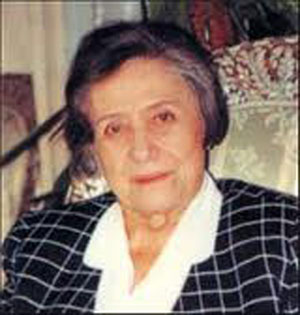
Born in 1912, to a traditional Damascene family, Ulfat Idilbi was a Syrian novel writer. She wrote books that became best sellers in the Arabic-speaking world, such as “Dimashq ya Basmat el Huzn” (“Damascus – the Smile of Sadness”, 1980), which was translated into many languages and filmed as “Basmat al Huzn”.
Idilbi educated herself by reading widely from the books in the library of her uncle, Kazem Daghestani, who was also an author. Then Ulfat began to write and publish stories about the Syrian resistance movement(during the French mandate) especially regarding the injustice of the aggressor and people who were involved in a struggle for their lives, freedom and the independence of their country (which was already exhausted by rule of Ottoman Empire).
Later she became a lecturer and wrote novels and essays on the social status of women in the Middle East, as well as on the pressure they undergo and the suffering they endure. Ulfat emphasized the theme of women often spending time in their own, non-existent world.
“Damascus, The Smile Of Sadness” is the most famous novel by Ulfat Idilbi, telling a story about a girl who grows up in times of nationwide chaos (1920s), caused by the French occupation. She becomes more conscious of her national identity, which is hardly supported by her family, who is conservative and does not allow Sabriya to leave the house except to go to school. The story tells of the injustices and deprivations she undergoes, caused both by the French occupiers and by her family, along with the loss of her beloved and her vow never to forget him. It’s been read as left by Sabriyeh (main character) in her diary, found after her death.
The film depicts an agonizing episode of Syrian women’s struggle to gain emancipation and gender equality
Under many circumstances, most of aspects included are author’s vision of reality, which Ulfat was a witness to, therefore should be considered as dramatized history.
She spent the last decades of her life between Damascus and Paris, where she died in 2007.
Maysa Wassouf

